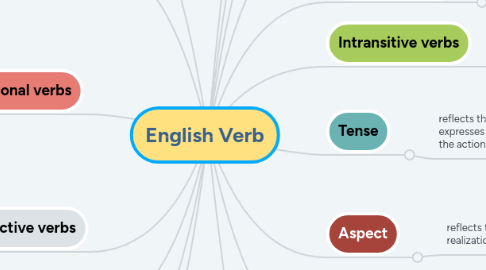
1. Non-finite verbs
1.1. perform different functions according to its intermediary nature (those of the syntactic subject, object, adverbial modifier, attribute), but its non-processual functions are always actualised in close combination with its processual semantic features: He wanted to find a solution.
2. Finite verb
2.1. perform the function of the verb-predicate, expressing the processual categorial features of predication, i.e. time, aspect, voice, and mood: The man runs to the store to get a gallon of milk.
3. Phrasal verbs
3.1. combine a base verb with another word, usually a preposition or adverb – known as a particle – to create a completely new meaning (stand up, sit down, get up)
4. Notional verbs
4.1. actional
4.1.1. do, act, perform, make, go, read, learn, discover
4.2. statal
4.2.1. be, live, survive, worry, suffer, rejoice, stand, see
5. Functional verbs
5.1. auxiliary verbs
5.1.1. to be, to have, to do
5.2. semi-notional verbid introducer verbs
5.2.1. relational semantics (seem, happen, turn out), of subject-action relational semantics (try, fail, manage), of phasal semantics (begin, continue, stop)
5.3. modal verbs
5.3.1. can, may, must, shall, will, ought, need, used (to), dare, be, have
5.4. link-verbs
5.4.1. be, seem, appear, look, feel, taste, become, get, grow, remain, keep
6. Limitive verbs
6.1. arrive, come, leave, find, start, stop, conclude, aim, drop, catch
7. Unlimitive verbs
7.1. move, continue, live, sleep, work,behave, hope,stand,
8. Transitive verbs
8.1. I admire your courage.
9. Intransitive verbs
9.1. I work for a large firm in Paris.
10. Objective verbs
10.1. I saw him yesterday.
11. Non-objective verbs
11.1. I'll go to the library at once and get this book out.
12. Person
12.1. grammatical category of the Verb indicating the doer of the action. It only exists in the future and present tenses of the indicative mood
12.1.1. first, second and third
13. Number
13.1. singular and plural
14. Tense
14.1. reflects the objective category of time and expresses the relations between the time of the action and the time of the utterance
14.1.1. Present
14.1.1.1. bus arrives in London at 6 p.m
14.1.2. Future
14.1.2.1. I’ll write that report on Thursday
14.1.3. Past
14.1.3.1. I met Lisa yesterday
15. Aspect
15.1. reflects the inherent mode of the realization of the process
15.1.1. continuous forms
15.1.1.1. John was fishing when the seals arrived
15.1.2. perfect forms
15.1.2.1. John had caught two mackerel before the seals arrived
16. Voice
16.1. expresses the relation between the subject and the action
16.1.1. active
16.1.1.1. He invited his friends.
16.1.2. passive
16.1.2.1. He was invited by his friends.
17. Mood
17.1. expresses the character of connection between the process denoted by the verb and the actual reality, either presenting the process as a fact that really happened, happens or will happen, or treating it as an imaginary phenomenon
17.1.1. The imperative mood
17.1.1.1. represented by the base form of the verb, or the bare infinitive
17.1.1.1.1. Come!
17.1.2. The subjunctive mood
17.1.2.1. expressed by both synthetic forms (infinitive, were, the past indefinite) and analytical forms (should/would + infinitive)
17.1.2.1.1. It was suggested that he wait till the next morning.
17.1.3. The indicative mood
17.1.3.1. The form of a verb that is used to express statements of fact
17.1.3.1.1. Whales are mammals, not fish.
17.1.4. The interrogative mood
17.1.4.1. This mood is used to ask questions. Interrogatives are formed by adding an auxiliary verb to another verb, with the auxiliary verb typically being placed before the subject
17.1.4.1.1. Are you coming out tonight?
17.1.5. The conditional mood
17.1.5.1. made from the auxiliary verb would (also should with I and we) and the infinitive of the other verb without to. It’s used to make requests and to refer to situations which are uncertain or which depend on something else happening or being the case
17.1.5.1.1. I would like some coffee please.

